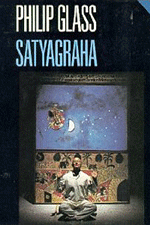> [Archived] Chronicles

Philip Glass' 'Satyagraha' from the MET seen at The Light Cinema
The traditional opera where soloists do what they are singing and sing what they are doing, where the action is conducted by text, where music is the psychological portrait of the performers and, in Verdi, is developing in acts or in Puccini, continuously, was beautifully contested in Philip Glass' 'Satyagraha'.
Challenging the traditional
On Saturday, November 19th, 2011, watching at The Light Cinema the live transmission from the Metropolitan Opera in New York, I have seen that in 'Satyagraha' there are four simultaneous planes, none completing the other. The text, fragments from Baghavad Gita, does not reflect the action on stage which centres on Mahatma Ghandi. The narration is played by the characters, recounted by their movements and their facial expressions. Suspended from a window out of the wall that delimits the stage, another character, a silent role, without any connection to the action on stage and the text, is playing the defining moment in his life. Anyway, the synopsis of the opera tells in detail what happens in every act, facts that have very little to do with the text and only vague connections with the action.
Philip Glass' 'Satyagraha' is played in Sanskrit, with no subtitles. This is what the composer wanted, because the text from Baghavad Gita must be heard, not read, and all the attention should be focused on music, not on words. Still, the text is projected in the background, in English, at the beginning or ending of each scene, for better understanding.
Philip Glass' music is a minimalist one: some motifs that are repeated for minutes on end, together with an au ralenti scenic performance. Because of it there is need for a designer to replace the lack of musical motion, so they created beautiful if sombre décors, costumes sometimes in earthly tone, other times brightly coloured, giant paper dolls depicting grotesque humans, animals and Indian gods, manoeuvred by actors on stilts.
Wonderful
But to give life to such music one would especially need wonderful soloist; this word perfectly describes soprano Rachelle Durkin, baritone Kim Josephson, bass Alfred Walker, who have framed tenor Richard Croft, a singer with a very beautiful, warm, melodious voice, human par excellence and a very good actor, who portrayed Ghandi.
Translated by Florina Sãmulescu
MTTLC, Bucharest University














